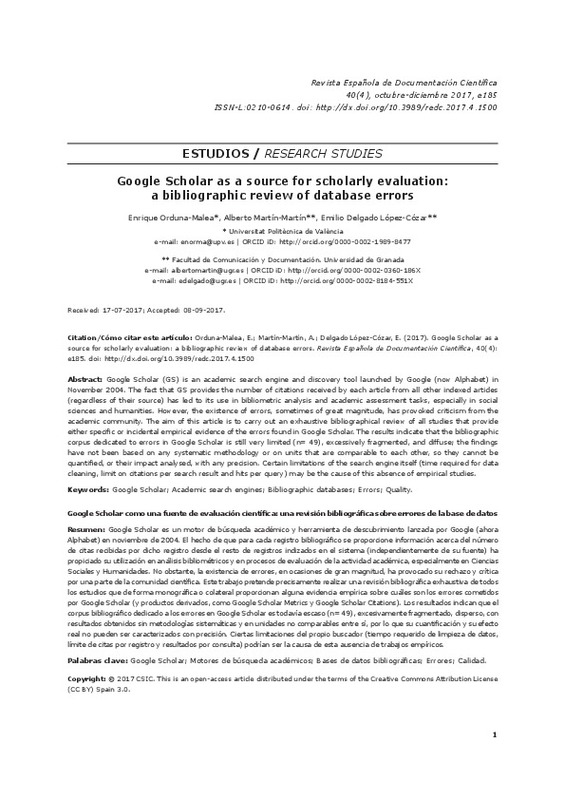|
Resumen:
|
[ES] Google Scholar es un motor de búsqueda académico y herramienta de descubrimiento lanzada por Google (ahora Alphabet) en noviembre de 2004. El hecho de que para cada registro bibliográfico se proporcione información ...[+]
[ES] Google Scholar es un motor de búsqueda académico y herramienta de descubrimiento lanzada por Google (ahora Alphabet) en noviembre de 2004. El hecho de que para cada registro bibliográfico se proporcione información acerca del número de citas recibidas por dicho registro desde el resto de registros indizados en el sistema (independientemente de su fuente) ha propiciado su utilización en análisis bibliométricos y en procesos de evaluación de la actividad académica, especialmente en Ciencias Sociales y Humanidades. No obstante, la existencia de errores, en ocasiones de gran magnitud, ha provocado su rechazo y crítica por una parte de la comunidad científica. Este trabajo pretende precisamente realizar una revisión bibliográfica exhaustiva de todos los estudios que de forma monográfica o colateral proporcionan alguna evidencia empírica sobre cuáles son los errores cometidos por Google Scholar (y productos derivados, como Google Scholar Metrics y Google Scholar Citations). Los resultados indican que el corpus bibliográfico dedicado a los errores en Google Scholar es todavía escaso (n= 49), excesivamente fragmentado, disperso, con resultados obtenidos sin metodologías sistemáticas y en unidades no comparables entre sí, por lo que su cuantificación y su efecto real no pueden ser caracterizados con precisión. Ciertas limitaciones del propio buscador (tiempo requerido de limpieza de datos, límite de citas por registro y resultados por consulta) podrían ser la causa de esta ausencia de trabajos empíricos.
[-]
[EN] Google Scholar (GS) is an academic search engine and discovery tool launched by Google (now Alphabet) in November 2004. The fact that GS provides the number of citations received by each article from all other indexed ...[+]
[EN] Google Scholar (GS) is an academic search engine and discovery tool launched by Google (now Alphabet) in November 2004. The fact that GS provides the number of citations received by each article from all other indexed articles (regardless of their source) has led to its use in bibliometric analysis and academic assessment tasks, especially in social sciences and humanities. However, the existence of errors, sometimes of great magnitude, has provoked criticism from the academic community. The aim of this article is to carry out an exhaustive bibliographical review of all studies that provide either specific or incidental empirical evidence of the errors found in Google Scholar. The results indicate that the bibliographic corpus dedicated to errors in Google Scholar is still very limited (n=49), excessively fragmented, and diffuse; the findings have not been based on any systematic methodology or on units that are comparable to each other, so they cannot be quantified, or their impact analysed, with any precision. Certain limitations of the search engine itself (time required for data cleaning, limit on citations per search result and hits per query) may be the cause of this absence of empirical studies.
[-]
|
|
Agradecimientos:
|
Alberto Martin-Martin is on a four-year doctoral fellowship (FPU2013/05863) granted by the Ministerio de Educacion, Cultura y Deportes (Spain). Enrique Orduna-Malea holds a postdoctoral fellowship (PAID-10-14), from the ...[+]
Alberto Martin-Martin is on a four-year doctoral fellowship (FPU2013/05863) granted by the Ministerio de Educacion, Cultura y Deportes (Spain). Enrique Orduna-Malea holds a postdoctoral fellowship (PAID-10-14), from the Polytechnic University of Valencia (Spain).
[-]
|









